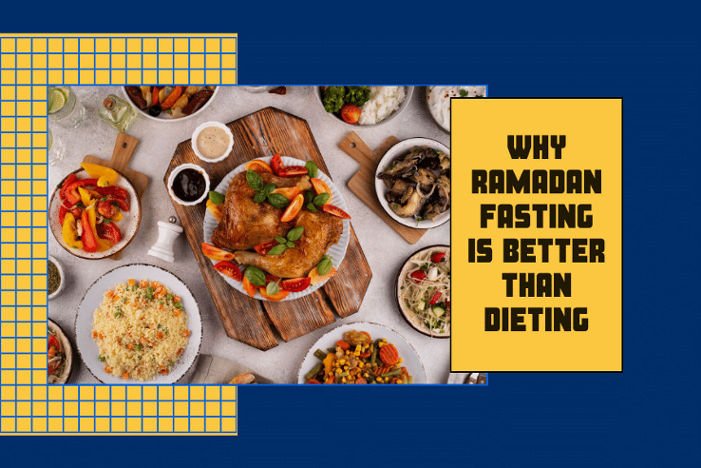In the pursuit of a better lifestyle, the decision between Ramadan fasting and traditional dieting is critical. Both techniques have an impact on health and eating habits, but which is the most advantageous option? Let us take a tour into the subtleties of these two techniques and their effects on well-being.
Benefits of Ramadan Fasting for a Whole Month
Detoxification: A Comprehensive Approach
Ramadan fasting extends beyond the conventional notion of dieting for weight loss. It consists of a detoxification process in which the body is thoroughly cleansed internally. The fasting phase allows organs to relax and regenerate, promoting optimal function and contributing to general health.
Conscious Eating and Self-Control
Unlike traditional dieting, which only focuses on calorie restriction, Ramadan fasting instills discipline and attentiveness in eating behaviors. The regimented nature of fasting pushes people to be more conscious of what and how much they eat. Thus, Ramadan promotes a long-term healthy connection with eating.
Spiritual and Emotional Wellness
Ramadan fasting is more than just a physical activity; it is deeply spiritual. Fasting is not just a physical activity, but also a mental and spiritual one. This spiritual aspect improves emotional health and strengthens feelings of inner serenity, thankfulness, and fortitude.
Community support and bonding
Fasting during Ramadan is unique in that it is done communally. People gather to fast together and foster a supportive atmosphere that goes beyond self-control. This sense of group support and bonding gives emotional strength and motivation, which are sometimes lacking in solitary dieting journeys.
Sustainable Modifications to Lifestyle
Month-long fasting during the holy Ramadan promotes a comprehensive approach to health that goes beyond the fasting period. Developing discipline and thoughtful eating habits throughout Ramadan can lead to long-term lifestyle changes. This allows individuals to maintain a balanced and health-conscious approach to nutrition throughout the year.
Proper Consumption of Foods
While dieting can occasionally result in dietary imbalances or shortages, fasting during Ramadan promotes a well-balanced nutritional intake. Suhoor and iftar, or pre-dawn and post-sunset meals, are meticulously arranged to contain a variety of dietary groups, ensuring that the body receives critical nutrients.
Better Processing
The intermittent fasting pattern observed during Ramadan allows the digestive system to relax and work more effectively. This can result in improved digestion, nutritional absorption, and fewer digestive difficulties, all of which contribute to overall health.
regulates blood sugar
Fasting throughout Ramadan can enhance insulin sensitivity and lessen the chance of developing type 2 diabetes. Insulin resistance, a precursor to diabetes, occurs when cells grow insensitive to insulin. Fasting lowers blood sugar levels, increases insulin sensitivity, and encourages the body to use stored glucose for energy.
Encourages Loss of Weight
Fasting promotes weight loss by limiting meal sizes and lowering calorie intake. However, to sustain progress, it is critical to avoid overeating following fasts. For long-term weight loss, it’s essential to continue exercising and maintaining a balanced diet during the non-fasting hours. Ramadan fasting provides an opportunity to reset eating habits and establish healthy food relationships.
Beneficial to Heart Health
Ramadan fasting improves heart health by lowering blood pressure and cholesterol, reducing inflammation, and increasing blood flow. This reduces the risk of heart attack and stroke. Before fasting, people with pre-existing heart issues should consult a doctor to make sure it is in line with their needs.
Enhances Mental Performance
Ramadan fasting improves cognitive performance and brain function significantly by increasing the synthesis of brain-derived neurotrophic factors. This protein promotes brain cell development and survival, which improves memory, learning, and mental clarity.
Enhances Growth Hormone Release
During Ramadan fasting, the body’s growth hormone release normally increases. According to research, fasting raises levels of human growth hormone (HGH). This hormone surge boosts metabolism, assists weight loss, and stimulates muscular growth, all of which contribute to the health benefits of fasting.
Could Increase Lifespan
A study on the influence of periodic fasting on the human stomach discovered an increase in the diversity of good gut bacteria, particularly Christensenella species, which are connected to lifespan. In addition, researchers discovered increased sirtuin levels, which are essential for metabolic regulation and longevity.
Lowering the Risk of Cancer
According to the American Cancer Society Journal, intermittent fasting may help in cancer treatment and prevention by reducing tumor development and chemotherapy toxicity in some cases. They do, however, emphasize the importance of more rigorous clinical trials and advise cancer patients to fast intermittently in clinical settings. More research is needed to fully understand the influence of fasting on cancer.
What are the 3 benefits of fasting in Ramadan?
There are two main benefits of fasting in Ramadan: spiritual and physical. Here are 3 benefits to consider:
- Spiritual growth: For Muslims, Ramadan is a holy month dedicated to prayer, reflection, and charity. Fasting helps focus on these practices and strengthens one’s connection to their faith.
- Improved health: Studies suggest fasting can have positive health impacts like lower blood pressure and cholesterol, potentially reducing the risk of heart disease.
- Increased empathy: Fasting can cultivate empathy for those less fortunate. By going without food and water for a set time each day, Muslims gain a greater understanding of hunger and thirst, which can motivate them to help those in need.
Is Ramadan fasting good for weight loss?
Ramadan fasting can lead to weight loss, but it depends on a few factors. Here’s the breakdown:
- Calorie restriction: During Ramadan, you naturally consume fewer calories since you’re not eating or drinking for a set period. This calorie restriction can lead to weight loss.
- Similar to intermittent fasting: Ramadan fasting shares similarities with intermittent fasting, which has shown benefits for weight loss.
- What you eat during non-fasting periods: The key to healthy weight loss during Ramadan is what you eat during Suhoor (pre-dawn meal) and Iftar (evening meal). If you focus on nutritious, balanced meals instead of sugary or fatty foods, weight loss is more likely.
- Starting weight: Studies suggest people with a higher BMI tend to lose more weight while fasting during Ramadan.
Overall, Ramadan fasting has the potential to aid weight loss, but it’s not a guaranteed outcome. Making healthy food choices during eating periods is crucial. Consulting a doctor or registered dietitian is always recommended before making any significant changes to your diet.
What is the scientific reason for fasting in Ramadan?
There isn’t one single scientific reason for fasting in Ramadan, but several potential health benefits observed in studies. Here’s a table outlining some possibilities:
| Body System | Potential Benefit | Scientific Explanation |
|---|---|---|
| Metabolism | Improved insulin sensitivity | When you fast, your body relies on stored glucose for energy. This can improve how your body uses insulin, potentially reducing the risk of type 2 diabetes. |
| Heart Health | Lower blood pressure and cholesterol | Fasting may decrease levels of LDL (“bad”) cholesterol and triglycerides, while potentially increasing HDL (“good”) cholesterol. This could reduce the risk of heart disease. |
| Cellular Health | Autophagy | During fasting, cells may undergo a process called autophagy, where they break down and remove damaged components. This could promote cellular health. |
| Brain Function | Increased BDNF production | Fasting may stimulate the production of brain-derived neurotrophic factor (BDNF), which plays a role in brain cell health and function. |
| Digestive System | Rest for the digestive system | By not constantly processing food, the digestive system may have time to repair and cleanse itself. |
What are the mental benefits of fasting in Ramadan?
Fasting in Ramadan can offer a variety of mental benefits, promoting a sense of well-being and improved mental health. Here are some key benefits to consider:
- Increased Self-Discipline: Abstaining from food and drink requires willpower and control. This practice of self-restraint can translate to other areas of life, strengthening your ability to resist temptations and achieve goals.
- Improved Focus and Clarity: When hunger pangs aren’t a constant distraction, you may experience sharper focus and improved mental clarity. This can be beneficial for studying, working, or simply being present in daily activities.
- Enhanced Mindfulness and Self-Reflection: Fasting creates a space for introspection. By quieting external stimuli like hunger, you have a chance to reflect on your thoughts, behaviors, and emotions. This self-awareness can lead to personal growth and positive change.
- Heightened Gratitude and Appreciation: Going without food and drink can make you appreciate these things more when you can finally have them again. This sense of gratitude extends to other aspects of life, fostering a more positive outlook.
- Boosted Mood and Well-being: The combination of self-reflection, gratitude, a sense of accomplishment from completing the fast, and the strong social connections formed during Ramadan can contribute to an overall improved mood and sense of well-being.
- Reduced Stress and Anxiety: Studies suggest fasting may have a calming effect, potentially lowering stress and anxiety levels. This could be due to factors like increased self-control and a focus on spiritual practices.
It’s important to note that these are potential benefits, and individual experiences may vary. Consulting with a healthcare professional is always recommended before starting any new fasting regimen.

I’m a seasoned content creator with 6+ years of experience crafting engaging, SEO-optimized content that drives traffic and rankings. I excel in keyword research, link building, and guest posting, ensuring your brand reaches new heights.

